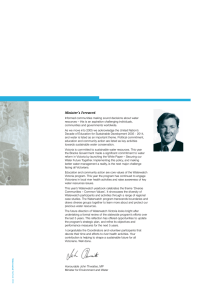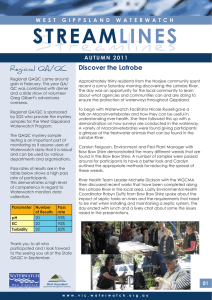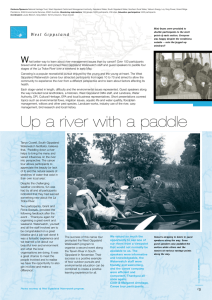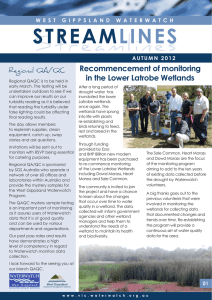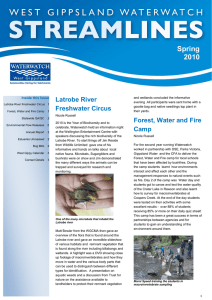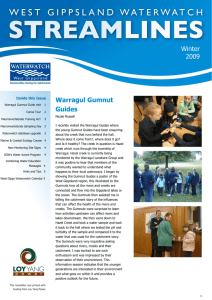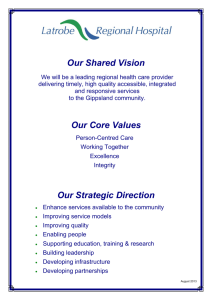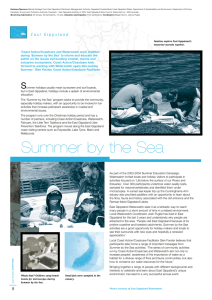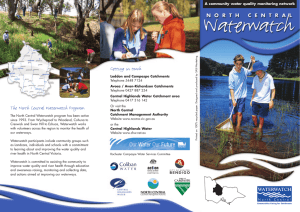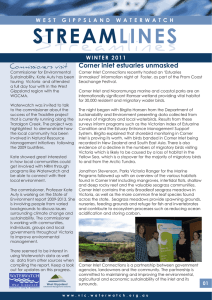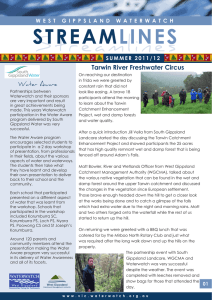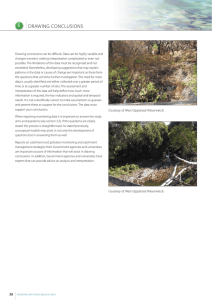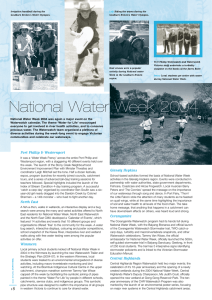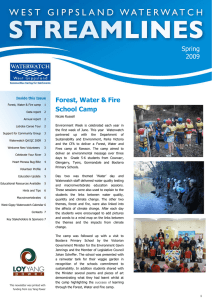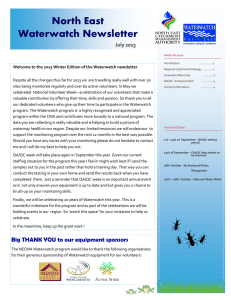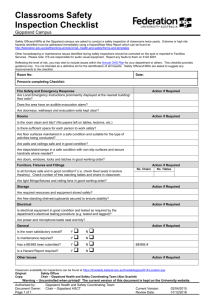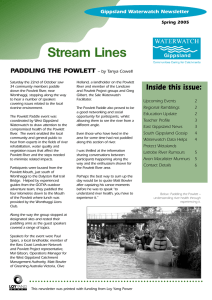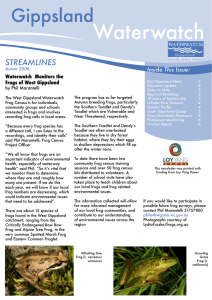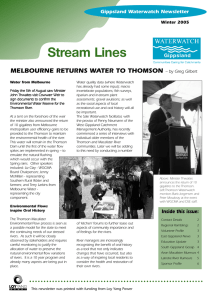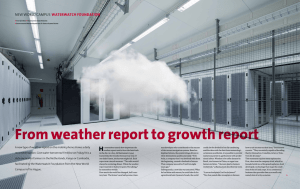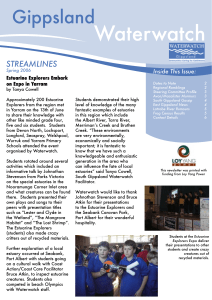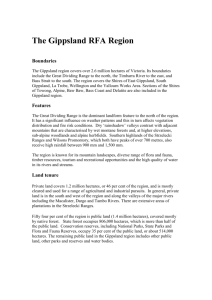Supporting Student Participation in Community Programs Regional QA/QC
advertisement
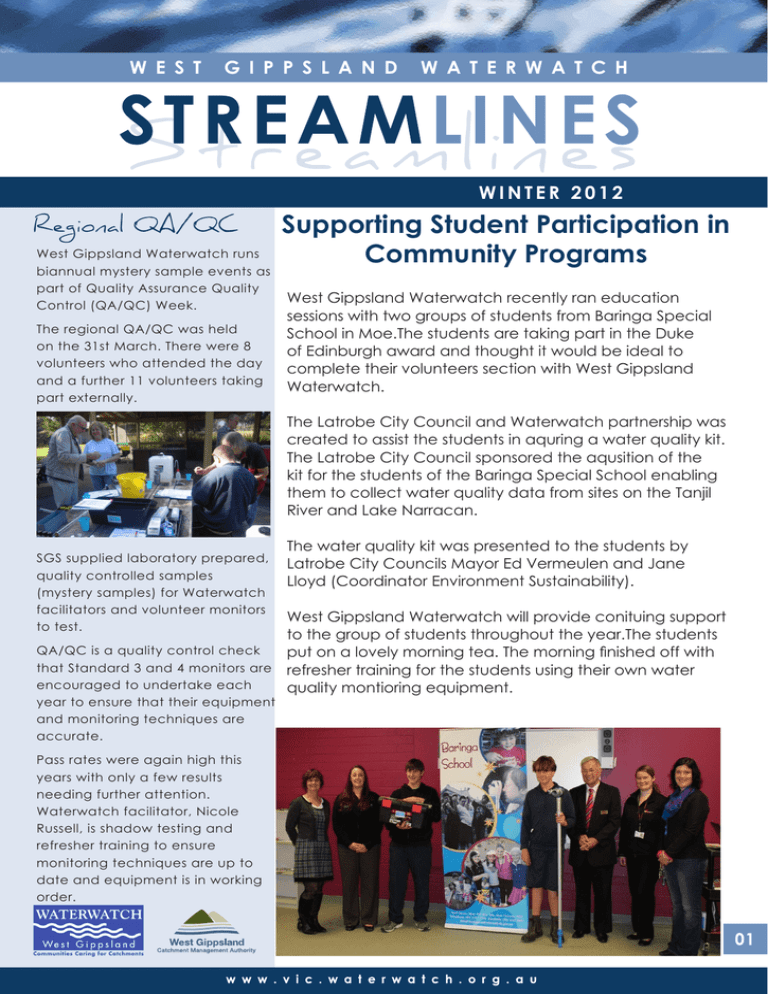
W E S T G I P P S L A N D W A T E R W A T C H WINTER 2012 Regional QA/QC West Gippsland Waterwatch runs biannual mystery sample events as part of Quality Assurance Quality Control (QA/QC) Week. The regional QA/QC was held on the 31st March. There were 8 volunteers who attended the day and a further 11 volunteers taking part externally. Supporting Student Participation in Community Programs West Gippsland Waterwatch recently ran education sessions with two groups of students from Baringa Special School in Moe.The students are taking part in the Duke of Edinburgh award and thought it would be ideal to complete their volunteers section with West Gippsland Waterwatch. The Latrobe City Council and Waterwatch partnership was created to assist the students in aquring a water quality kit. The Latrobe City Council sponsored the aqusition of the kit for the students of the Baringa Special School enabling them to collect water quality data from sites on the Tanjil River and Lake Narracan. SGS supplied laboratory prepared, quality controlled samples (mystery samples) for Waterwatch facilitators and volunteer monitors to test. The water quality kit was presented to the students by Latrobe City Councils Mayor Ed Vermeulen and Jane Lloyd (Coordinator Environment Sustainability). West Gippsland Waterwatch will provide conituing support to the group of students throughout the year.The students QA/QC is a quality control check put on a lovely morning tea. The morning finished off with that Standard 3 and 4 monitors are refresher training for the students using their own water encouraged to undertake each quality montioring equipment. year to ensure that their equipment and monitoring techniques are accurate. Pass rates were again high this years with only a few results needing further attention. Waterwatch facilitator, Nicole Russell, is shadow testing and refresher training to ensure monitoring techniques are up to date and equipment is in working order. Communities Caring for Catchments Student Exchange Darnum and Japan The Darnum Primary has an exchange program with a school from Japan. This has been running biannually for 16 years. This year they included activities organised by Waterwatch and the Department of Sustainability and Environment. West Gippsland Waterwatch ran an aquatic macroinvertebrates survey activity at Coopers Creek. This allows the students to gather information and awareness of the importance of a healthy catchment. A translator allowed the Japanese students to participate with students from Darnum Primary school as they learnt how water bugs could be used as biological indicators of river health. All the students, using the sweep technique, sampled for water bugs in the Thomson River and then identified them to assess the health of the river. A great day was had by all the students and teachers learning how to manage natural resource in a local and global context. Perry River Canoe Tour The Perry River is a unique river with it being one of the few remaining chain of ponds systems. A Perry River canoe tour was held in April as a way to introduce the community to the uniqueness of the river and the discuss the covenants protecting the wetlands in the estuarine areas of the river. Participants launch from the lower part of the Avon River and then paddle up into the Perry River where they got to hear from Rivers and Wetlands Officer Matt Bowler on the importance of protecting and enhancing the wetlands areas of these rivers. To strengthen the point everyone was treated to a display of Pelicans, a Wedge Tail Eagle and other various birds all riding the thermals together above the wetlands. The protecting of these sorts of habitats allow many bird species to feed, roost and sleep. Next participants heard from Debbie Topp from Trust for Nature about the work that goes into trying to protect these sorts of areas and how landholders are putting covenants on their land to protect these incredible habitats for native fauna and flora. Waterwatch facilitator, Nicole Russell finished up the tour with water quality testing. She demonstrated the difference between the Avon and Perry Rivers in terms of the salinity levels showing that the Perry river gets very limited fresh flows showing high levels of electrical conductivity. This displays the various habitats that are created in different systems making them a hotspot for biodiversity. As a finale to the day participants discussed and observed the various techniques used by the CMA and landholders in rehabilitating and improving the health of a river and its wetlands; and the importance of creating valuable habitat Welcome to new volunteers • Jemima Milkins • Baringa Special School • Brett Davies Estuaries Unmasked in Inverloch Each year the WGCMA EstuaryWatch program hosts an Estuaries Unmasked seminar in a coastal area. These seminars are designed to provide EstuaryWatch volunteers and the community with a greater awareness of estuarine processes and functions and the diverse projects and work undertaken to protect and enhance the health of various coastal habitats. EstuaryWatch is a community estuarine monitoring program that began in the Bunurong catchment two years ago. The first EstuaryWatch group started monitoring on the Powlett River with a second group beginning a year later on Coal Creek at Harmers Haven. The Estuaries Unmasked seminar began with WGCMA river and wetlands officer Matt Bowler providing an overview of the estuarine systems that are found in the West Gippsland region. Matt highlighted the differences in some estuary conditions using photos from the 1800’s to now and the recovery that can occur only after a few years of protecting habitats. Mike Cleeland, the education officer at the Bunurong environmental centre delighted the audience with dinosaur fossils that were found in estuarine and riverine areas around Gippsland, which highlighted how important these habitats have been through the years to all species. James Hattam, Coastal Project Coordinator with the Corangamite CMA, discussed a new project aimed to protect and enhance saltmarsh habitats on public land. This Coastal tender process is a way of making these habitats valuable assets for landholders to safeguard for species such as the Orange-bellied parrot. Local commmunity member Cheryl Tyler believes that the Estuaries Unmasked night seminars are important because they “raise awareness of the importance of estuaries and their location” Farewell I would like to take this opportunity to say thank you to all the volunteers and sponsors for all the support they have given to the Waterwatch program in West Gippsland. In my time as Waterwatch facilitator for West Gippsland Waterwatch I have seen the volunteers endeavor to advance their water quality monitoring techniques to ensure the health of their waterways is improved and protected. Such passion inspired my dedication to the program. I will be sad to leave this incredibly diverse region but I am positive that the community will continue to display their passion for the natural environment through community programs such as Waterwatch. Best wishes to everyone for the future. Yours sincerly Nicole Russell, Waterwatch Facilitator West Gippsland Waterwatch Contacts Nicole Russell Marni Speed Michelle Dickson Tanya Cowell Facilitator PO Box 1374, Traralgon 3844 Phone: 1300 094 262 Email: tanyac@wgcma.vic.gov.au Facilitator PO Box 1374, Traralgon 3844 Phone: 1300 094 262 Email: nicoler@wgcma.vic.gov.au River Health Team Leader PO Box 1374, Traralgon 3844 Phone: 1300 094 262 Email: michelled@wgcma.vic.gov.au Key Stakeholders and Sponsors Facilitator PO Box 1374, Traralgon 3844 Phone: 1300 094 262 Email: marnis@wgcma.vic.gov.au
